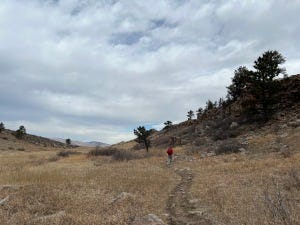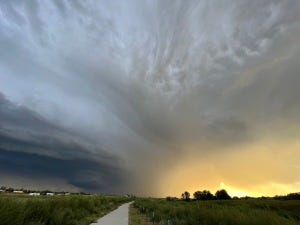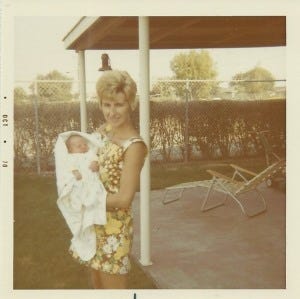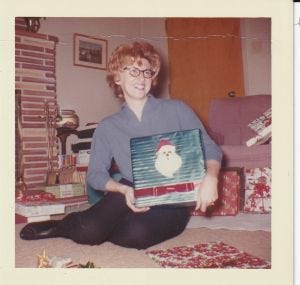Shining the light on the ground beneath my feet
Have you ever looked down and found that you are standing on something rather unexpected?
I grew up in a place that experienced frequent small earthquakes. If you have ever felt one, you know that no matter how small the movement of the solid earth beneath you, it always throws you off center. Sometimes you feel like it must be in your head, this sudden motion from something that felt so solid. You might feel a bit queasy, a bit off balance, like the world isn’t as it seems. If you’ve studied a bit of geology, you’ll know that there’s a whole world beneath your feet that you really can’t see with your own eyes – and it’s always moving and shifting.
The rocks beneath our feet also hold stories of Earth long ago. Fossils show us the shape of life, and the chemistry encoded in those fossils, and the rocks that hold them, tell stories about an Earth that was very different from the one that we know today. Yet these stories are very much a part of our own story. So much so, that they have shaped everything about who we are and where we are going. More than twenty years ago, when I began my PhD in Paleoclimatology, I became fascinated by the process of trying to reconstruct stories of our Earth. I became skilled at understanding how to interpret clues.
Our bodies are encoded with the story of our past as well. Our DNA holds a story – the story of our parents, our grandparents, their parents, and onward back in time. As with geologic data, the further back in time you go, the fewer clues you will find, the more difficult it is to write the story. But sometimes you don’t have to go too far back to find something so unexpected that it makes you feel as though the ground beneath you has been washed out in a storm. You wobble to and fro trying to find your balance, just as you would on a ship in a storm, as you come to terms with the fact that things were not exactly what they seemed.
I was hit by one of those storms right after last Thanksgiving when I learned that I have an older brother. I have lived and walked on this planet for more than half a century. I thought I knew the shape and texture of the ground beneath my feet. But I had no clue.
As with Earth history, I have always been interested in family history – in learning about my grandparents and great-grandparents, and how they lived on this earth. I’ve always been fascinated by how they survived in a world undergoing rapid change, in part because I live in a world of rapid change, and it’s damn difficult.
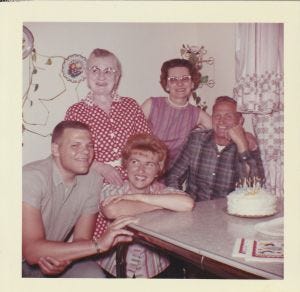
When my mom’s brother, my Uncle Jerry, started posting pictures of our German relatives and ancestors on Facebook last fall, I was excited to see him looking into it. I don’t have the time myself to go down the rabbit hole of ancestry research, but I was glad he was doing it. Jerry told me he was taking a DNA test. I thought he was looking for clues as to the identity of my grandpa Gus’s father. When he got his results back and sent me a message urging me to take the test too, the scientist in me was intrigued. And, hey: there was a Black Friday sale on DNA tests! I ordered a test for myself.
After I told Jerry that I had ordered the test, I was surprised to get another message from him asking for a time to chat. He said he had something to share with me. Had he found my grandpa’s father? Were we connected to some famous (or infamous!) figures in history? I had no idea.
I was surprised when he started our conversation by telling me about the summer before his sophomore year of high school, August 1961 in Sacramento, and how my mother, who was on the cusp of her 19th birthday was suddenly sent off to college in San Francisco. How he didn’t see her again until she came home in late January of 1962, when he was told that ‘college was done’. He told me how every weekend, my dad would come over to the house, and he and my grandparents would pile in the car and go off to visit her in San Francisco, and Jerry was never allowed to go along. He told me how my mother came home from college somehow changed.
Jerry suspected she had had a baby.
Then in 2004, before my grandpa died, he told Jerry that my mother had indeed had a baby boy, and had given him up for adoption. My grandmother confirmed the story and told him that they had not spoken of it since it happened. Never. Jerry wanted to tell me and my younger brother, but respected the wishes of my parents that we not know about it – until the day I ordered that DNA test and it became clear that I would find out anyway.
Here’s the thing I love about science: there are really no secrets. Everything is revealed at some point. And DNA ancestry services make it fairly easy to find the missing people in your family. At least, if they have also taken a DNA test.
And that’s how Jerry found my big brother.
He was clearly my mother’s son – as I discovered the first time I talked with him. But I suspected he had a different father. So what was my dad’s role in all this?
Mom died nearly 10 years ago. Here’s the story we’ve been able to piece together, thanks to 23AndMe, Jerry and my dad: Mom was pregnant when she met Dad in early summer of 1961. But we are certain she didn’t know it. In fact, due to the complete lack of sex education back in those days, she probably didn’t know until she was well into her second trimester, in August 1961. That’s when my dad said he went over to her house to visit her and my grandma told him she was pregnant. The baby wasn’t his, and he said he had a choice to make: to walk away or stick with her. And this is the sweet part of the story: he loved her, so he stayed by her side.
She was sent to a maternity home in San Francisco to carry the baby to term. Dad visited her with my grandma and grandpa every weekend he could. Those are the early dating days I could never have imagined for my parents — meeting up every weekend in San Francisco, chaperoned by grandma and grandpa, while Mom became visibly more pregnant as time went by.
My Dad said he was never privy to any conversations about the baby or about the pregnancy. He wasn’t there when she gave birth, in early 1962. He couldn’t remember if he was ever told if it was a boy or a girl. Mom went back to Sacramento, and she and Dad continued on as though nothing had ever happened. They married in May 1963.
She never, ever, talked about it again. Not with my Dad, or her mother, or anyone else, as far as we can tell.
And that’s the thing that breaks my heart. That’s the thing that brings me to tears at least once a week. The thing that has opened up the grief and love that I felt for her. And it kills me that she wasn’t the only woman silenced by a society that refused to believe its teens were having sex — and then tried desperately to cover it up. A society that disproportionately faults, shames, and punishes women, not the men who fathered their babies, no matter the circumstances under which the baby might have been conceived.
One and a half million middle class White girls waited out their pregnancies in maternity homes in the US in the 20 years or so before Roe V. Wade in 1973. I found a book with interviews of women who gave up their babies, and I devoured every word. It’s the only way to have any clue as to what my mother experienced. Many of these women were threatened into silence as they were forced to give up their babies. Even the women who knew they weren’t ready to be mothers became attached to their babies during pregnancy and spent the rest of their lives in a silent hell, missing the child that was pulled away from them. Most never told their subsequent children. Many never told their eventual husbands. It was too painful and too scary. And their stories were basically erased. Their babies went on to supply a flourishing adoption market. (Incidentally, single, Black, unwed mothers during this era were expected to keep their babies – see references at the end of this post for a book about the politics of race in women’s reproductive choices, or lack of choices, as the case may be.)
I felt like I knew my mother. I felt close to her. I know she loved us, more than anything on this earth. I can understand why she wouldn’t tell my younger brother and I when we were young…but when we were in our 30’s? or 40’s? I have to think it wasn’t about us, or how we would react. This was about something so deeply repressed that she couldn’t have spoken even if she had inklings to do so.
It kills me to think of the silent pain that she carried her entire life. And I wonder if that contributed to the chronic migraines, the strange ailments she had. The cancer. Modern science has shown us how stress has physical manifestations in our bodies. Its impact manifests on cellular and genetic levels, and in the chemical makeup of our bodies. What happens when you repress your deepest sorrow, your most gut-wrenching pain, for 52 years?
I am not angry with her. I feel betrayed that she could never tell me. But at the heart of that betrayal is utter grief at what she went through. A grief that she was never able to share with anyone. I feel angry with a world that would put her in a position of not having a choice: not having access to or knowledge about birth control measures at 18, not having a choice to end a pregnancy, not having the choice to keep her baby, not having a choice to ever see her son again, and then not having the choice to share with anyone what she had been through.
I see just how much privilege and choice I’ve had in my own life, and ultimately, that has led to a life without children. I really believe that if my mom had been born with the privileges and choices that I have had (not to mention a class on sex ed in high school), my older brother would never have been born, and likely, neither would I nor my younger brother. Her life would have resembled something closer to my own.
If it makes you sad to think she might have had a life without children, just know that I don’t miss the children I have never had. (And more on that probably deserves its own blog post).
But to bring someone into the world as a baby and never see him again? Never know anything of him again? Never feel like you could talk about him again? That, I think, is an inhumane cruelty.
Some of you may think: But that’s just how things were back then, that’s what was done. Middle class White girls who became pregnant before marriage were sent off to have their babies in secret and give them away in order to protect their reputation and the reputations of their families – to preserve the myth of innocence. And they were threatened never to speak of it again.
Well, it was WRONG.
This is not an argument against adoption. I think adoption can be a wonderful thing. My older brother has had a good life with a loving family. But for so long, the stories of birth mothers have been erased – their feelings, experiences, impacts on their lives, have been completely disregarded. This is wrong.
While there is deep sadness in learning all this, the fact is, I am utterly thrilled to have an older brother. Yes, this is deeply complex emotionally, lots of grief and joy swirling around at the same time. In a world where people try to put things in boxes: good or bad, happy or sad, red or blue, the fact that how we live our lives is actually quite complex is often disregarded. We have opportunities in every moment to embrace emotional complexity and hold a huge number of competing emotions in our hearts. I think that is one of our most amazing abilities as humans, and it often goes overlooked. (Maybe animals experience this too, but that’s hard to test).
So, I am thrilled: there was a baby born in our family! Ok, it so happens that he was born to my mom more than eight years before I came along, but the fact is, I have a new brother. The first time I talked to him, I had flashbacks to seeing my younger brother for the first time: my dad and I stood on a gravel pathway outside the window of the hospital (I was too young to be allowed inside), and a nurse brought this tiny little bundle to the window. I remember thinking – even at that age – Wow! I have a brother! It would be nearly 50 years before we would learn that we already had an older brother.
I debated how to tell this story here. Maybe, some of you who knew my mother feel that I am dishonoring her memory by sharing her deepest secret with the world. My mother has been gone almost 10 years. This is no longer her story. The fact that she brought my brother into the world when she did impacted everything that came afterward. It impacted the foundation of my life, how I was raised, the relationship I had with my mom, all my memories. Everything was built on this thing that was hidden from me. I am who I am because my older brother exists. This is now my story and the story of my two brothers.
My mother lived 52 years in silence. There are millions of other women who have similar stories from that era, and these stories need to see the light of day now more than ever. My mother was an ardent supporter of women’s rights – and a woman’s right to choose. But she never had a public voice. I guess you could call her a ‘closet feminist’. You would never have found her marching in a protest, screaming for the passage of the Equal Rights Amendment (BTW: after more that 100 years, it has still not been officially certified as the 28th amendment) or burning bras (although, if she had lived long enough, you can bet she would have been knitting pussy hats and sending them off with women to the marches in D.C. in 2017). But she did everything she could to ensure that I would have a voice. It would dishonor her memory not to use my voice as she intended, and not to tell her story here.
My mother was a brave and resilient women. Those of you who knew her, likely knew her as someone who held her thoughts and considered her words carefully. She was an upstanding citizen – and loved by many in Hollister, CA, where she spent most of her life. She loved the kids in her classes (even when they drove her crazy). She was thoughtful and kind and reserved. And I don’t think she could ever fully be herself.
I write this post so that we remember not only my mom, but the 1.5 million women who had similar experiences.
“History is a fragile and contested terrain, where power determines whose stories are heard and whose are silenced.” – Michel-Rolph Trouillot
Let every woman’s voice be heard. And for the women who cannot find their voices, may the rest of us shout louder until we shake the foundations of the world and rebuild it in such a way that every person can speak their truth.
Miss you so much, Mom. And I’m so, SO sorry we could never talk about this together.
Postscript and References
As I mention briefly above, I went down a rabbit hole researching the experiences of young unwed birth mothers in the 1950’s and 1960’s who went to maternity homes. This was a time now known as the ‘Baby Scoop Era’. The stories of experiences from these maternity homes are not pleasant. Most women say that they were told that they were horrible, immoral people and didn’t deserve to be mothers. They were told that they would never be good mothers. (My mom often said that she thought she’d be a terrible mother, and that’s why she waited so long to have me.) Many were threatened with huge bills if they began wavering in their decision to give up the baby. Many were told that they would have legal action taken against them if they ever came looking for their babies. Many were told they could never talk about what had happened. Many of the birth certificates of these babies have no parents listed – this is the case with my brother.
In case you’re wondering: My DNA test has proven he is my half-brother, and that we share the same mother.
Below are some links to resources I found.
Book: The Girls Who Went Away: The Hidden History of Women Who Surrendered Children for Adoption in the Decades Before Roe v. Wade, by Ann Fessler (2007)
The Baby Scoop Era Research Initiative
Book on the role of the politics of race in women’s reproduction in the Baby Scoop Era: Wake Up Little Susie: Single Pregnancy and Race Before Roe v. Wade by Rickie Solinger (1992)
Time Magazine: What History Teaches Us About Women Forced to Carry Unwanted Pregnancies to Term, by Kelly O’Connor McNees (2021)
‘Maternity Homes’ Still Exist — Then vs. Now by Amber Leventry (2021)
The Washington Post: A shame-filled prison inside the maternity homes that forced teen moms to give away their babies (2018)
Adoption-Induced Posttraumatic Stress Disorder in Mothers of the Baby Scoop Era, by Karen Wilson-Buterbaugh (2010)
Adoption in the Baby Scoop Era: The Sordid History of Adoption in America, Psychology Today (2021)




